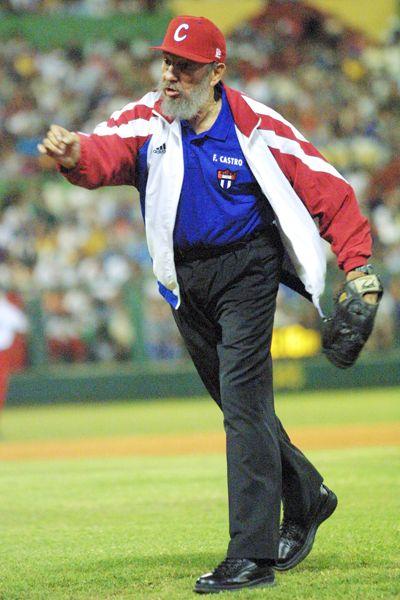Long before Fidel Castro became the revolutionary leader of Cuba, he harbored a different kind of ambition-one rooted in the diamond. New insights reveal that Castro once aspired to a career in professional baseball, a sport deeply woven into Cuban culture. This surprising chapter in the life of one of the 20th century’s most controversial figures offers a unique glimpse into the early dreams that shaped him. Yahoo Sports delves into the lesser-known story of Castro’s near brush with the world of professional baseball, exploring how close he came to trading revolutionary rhetoric for a baseball glove.
Fidel Castro’s Early Passion for Baseball and Its Impact on Cuban Sports Culture
Long before Fidel Castro became the emblematic revolutionary leader of Cuba, he was a young man with a notable talent for baseball. Immersed in the sport from an early age, Castro not only played but seriously considered the possibility of pursuing a professional career. His prowess on the diamond was well recognized among peers, and there are accounts suggesting he attracted the attention of scouts from both Cuban leagues and U.S. Minor League teams. This behind-the-scenes glimpse into Castro’s formative years sheds light on a lesser-known facet of his life, revealing how deeply ingrained baseball was in his identity.
The impact of Castro’s passion for baseball extends beyond his personal history; it also helped shape Cuban sports culture in enduring ways. Under his leadership, baseball became a significant pillar of national pride and international competition. Key developments included:
- Investment in youth programs aimed at nurturing local talent from an early age.
- The establishment of the Cuban National Series, which unified domestic leagues into a high-level professional competition.
- State support for baseball infrastructure facilitating access to training facilities across provinces.
| Year | Baseball Milestone |
|---|---|
| 1959 | Revolution ushers state involvement in sports |
| 1961 | First Cuban National Series launched |
| 1971 | Baseball officially declared national sport |
Through these initiatives, Castro’s early love for baseball didn’t just remain a personal passion but evolved into a foundational component of Cuba’s cultural and athletic identity, influencing generations of players and fans alike.
- Advertisement -
The Untold Story Behind Castro’s Near Transition to Professional Baseball
Before Fidel Castro became a towering figure in global politics, his early life held a surprising chapter tied to America’s favorite pastime. As a youthful athlete, Castro showed exceptional promise in baseball, a sport he passionately pursued during his formative years in Cuba. Scouts from professional teams reportedly took notice of his natural talent, particularly his pitching ability and fierce competitiveness on the mound. Sources suggest that Castro was even invited for tryouts with major league teams in the United States, a rare opportunity for a young Cuban at the time. However, these prospects were ultimately curtailed as his political ambitions and revolutionary goals began to take precedence.
Key factors that influenced Castro’s pivot away from baseball include:
- Growing socio-political tensions in Cuba during the 1940s and 1950s
- His increasing involvement in student activism and political organizing
- The logistical challenges and cultural barriers facing Cuban players entering the U.S. leagues during that era
This unexpected juxtaposition between athletic promise and revolutionary zeal offers a unique perspective on Castro’s multifaceted life, revealing how a potential sports career might have altered the course of history.
| Year | Event | Outcome |
|---|---|---|
| [1945 | Cuban Amateur League MVP | Recognition as a top pitcher |
| 1947 | Tryout Invitation in U.S. | Considered for minor league teams |
| 1952 | Political Activism Uptick | Baseball shifted to secondary priority |
| 1953 | Arrest and Imprisonment | End of any professional sports pursuits |
What Modern Athletes Can Learn from Castro’s Athletic Ambitions and Political Legacy
Fidel Castro’s early passion for baseball offers modern athletes valuable insights into balancing ambition with resilience. Before his rise as a political figure, Castro dedicated himself to the sport, showcasing discipline and a relentless drive that transcended the field. His journey reminds athletes today that persistence is key, even when faced with unexpected detours. The ability to adapt – whether dealing with injuries, setbacks, or changes in career trajectory – can define success as much as raw talent.
Beyond personal athleticism, Castro’s political legacy underscores the power of leadership and vision in sport. Modern athletes often serve as role models and agents of social change. Embracing this dual responsibility requires:
- Commitment to a cause beyond personal gain
- Strategic thinking to influence broader communities
- Resilience in the face of public scrutiny
Ultimately, Castro’s story illustrates how sports can be a platform for cultivating qualities that extend far beyond competition, preparing athletes to impact society on and off the field.
| Attribute | Castro’s Example | Modern Athlete Application |
|---|---|---|
| Discipline | Daily baseball training despite challenges | Consistent practice and self-regulation |
| Leadership | Leading a revolution with clear vision | Advocating for social issues in sport |
| Resilience | Bouncing back from initial setbacks | Handling pressure and public expectations |
In Summary
While the dream of Fidel Castro stepping onto a Major League Baseball diamond never fully materialized, the revelation of his youthful ambitions adds a compelling layer to the complex legacy of Cuba’s revolutionary leader. This intriguing chapter underscores the unlikely intersections between sports and history, reminding us that even figures defined by politics once entertained radically different futures. As Fidel Castro remains a towering figure in global history, the “what if” of his potential baseball career continues to captivate curious minds and baseball fans alike.


